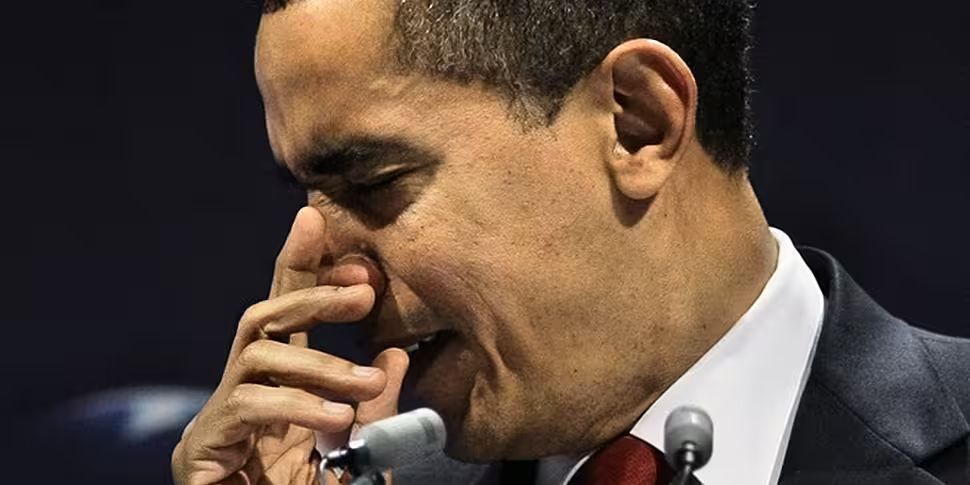Our bodies can sometimes work in mysterious ways, producing involuntary reactions that we’re not fully in control of, for example, sneezing.
When we’re under the weather or we find ourselves irritated by some external factor, our body will react by expelling air from our lungs through our nose and our mouth with a huge amount of pressure.
Whether that sneeze comes in the form of a small, discreet “achoo” or a huge, howling explosion, the seemingly humble sneeze is still a bit of a mystery for scientists.
On Futureproof, Jonathan McCrea spoke with Lydia Bourouiba, the head of a new lab at the Massachusetts Institute of Technology, where they are conducting some interesting research into the area of Fluid Dynamics of Disease Transmission.

Image: German Chancellor Angela Merkel, right, sneezes as she and Russian President Vladimir Putin attend the Petersburg Dialogue at the Kurhaus resort in Wiesbaden, Germany. Anja Niedringhaus/AP/Press Association
Falling under that category is the science of sneezing, and investigations into why our body decides to produce that exact reaction.
There are many different causes for the different types of sneezes that we experience, but in terms of disease transmission, sneezing is produced when an invasion of the body by pathogens is detected. That creates more mucus, a buildup of which causes irritation and generates the sneeze, but what’s going on beneath the surface is a series of more subtle processes.

Image: Peter Jordan / PA Archive/Press Association Images
We all sneeze at different things, but we also all sneeze differently, from small, silent movements to loud dramatic explosions, and Bourouiba explained why that is: “people of different sizes and shapes of course have different lung capacities, and slightly different lengths of their airways or trachea, and the differences in sounds are really caused by those physiological differences”.
In order to examine why people sneeze, you first have to make people sneeze, which is not as easy as it sounds, in particular in a scientific setting.
Bourouiba noted that they tried a number of different tactics including some of the usual suspects such as light, dust, and pepper, but they found that “nose tickling is the most universal way of having individuals sneeze and not disrupting the flow. The droplets in the airflow come mostly from the mouth, so you could have some emissions from the nose, but it’s actually dominated by the mouth, so nose tickling was the best way to produce the reflex and not interfere”.
Despite the loud, drawn out noises that some people make, the sneeze itself is actually a very short process, lasting only between 150-200 milliseconds. However, it forms a cloud that can carry the droplets from the sneeze over a surprisingly long distance: “Potentially the smallest drops can span five to six metres, if not more, depending on the moisture and the temperature in the room”.
While it might look like fun to perform an experiment to examine a physiological reaction by tickling someone’s nose, the reasons behind the research are rather important.
“The data is actually critical to understand better the matters of infection and transmission,” states Bourouiba, “especially now that we spend so much time indoors and we see so many emerging and re-emerging pathogens that can travel very quickly across the world”.
The research performed by her team at MIT will help to inform how best to intervene when diseases start to spread, something that is “a major blindspot that we have right now in public health when we give recommendations; we do not understand the process of transmission well, at all”.
Given that sneezing can spread disease quickly to other people, its origins are therefore questionable - why would humans evolve the ability to do this if it was harmful in some way?
Bourouiba’s studies have shown that “it’s a very efficient clearing and removal mechanism to clear the airways and the nasal cavities, so in some sense it is a defence mechanism to clear all sorts of things, [but] it’s not clear whether it was a co-evolution also of pathogens and viruses or bacteria”.









